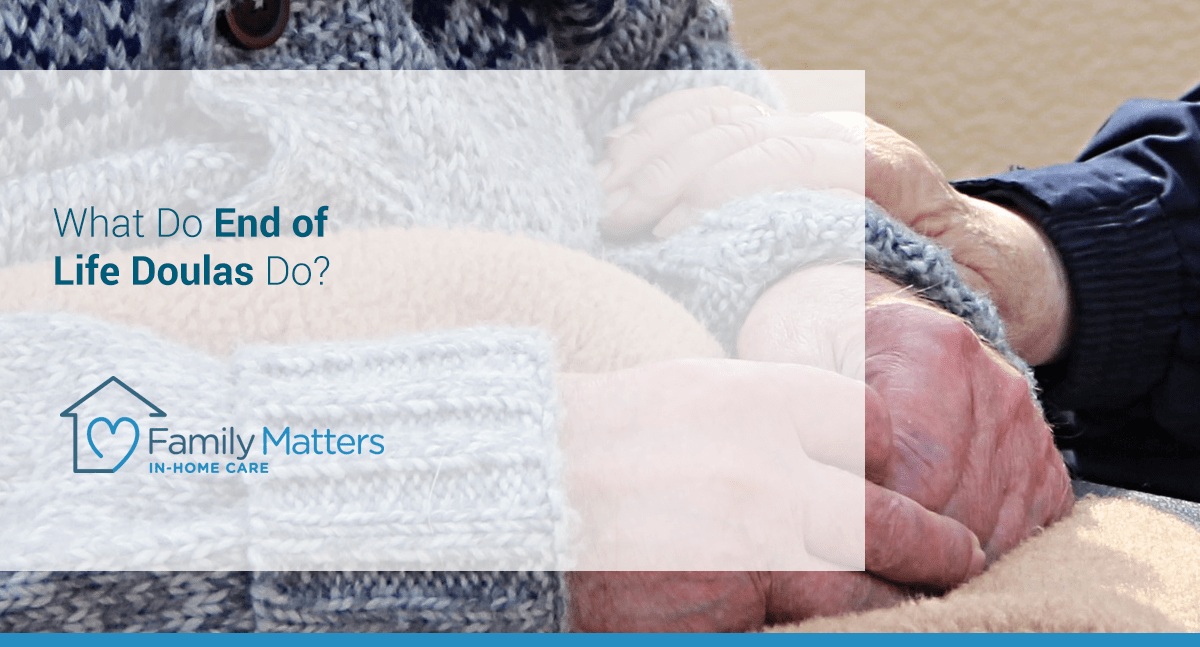
What Do End of Life Doulas Do?
If you’ve heard the term “doula” before, it was probably in reference to someone who provides support services during and after pregnancy and childbirth. Not to be confused with midwives, who are health care professionals, these certified professionals are trained to provide personal care and support to mothers during pregnancy, delivery, and after, but they don’t deliver babies or offer any medical care.
What you might not know is that there are also end of life (or death) doulas whose job it is to provide non-medical support services for those who are dying and their families. This is different from hospice care, for example, which is administered by health care professionals and intended to make a terminal patient (typically with less than six months to live) physically comfortable during their remaining time.
What, exactly, is an end of life doula? What training does this professional have and what services are offered? What are the benefits of working with an end of life doula? Here’s what you need to know.
What is an End of Life Doula?
An end of life doula is a caregiver that provides support services to individuals who are dying, as well as their families. How is this different from hospice care? Hospice services are focused on patient care, insomuch as they try to improve quality of life for the dying patient, while not necessarily trying to extend life, as medical professionals do.
In some cases, hospices include additional support services for family members, but doulas provide something that many hospices can’t – personal companionship, care, and support intended to help the patient and loved ones transition. In other words, doulas help to prepare patients and their families for death, and make the process of dying less painful and abrupt for everyone involved.
What End of Life Doulas Do
The role of a doula can vary from one situation to the next. Doulas typically work with clients to determine what patients and families need. This complementary service is meant to work alongside hospital or hospice care, offering support that these other services don’t necessarily provide.
This could mean sitting with a patient when no one else is available and providing companionship and emotional support to patients and their family members. Doulas may act as patient advocates, provide educational resources, and facilitate end of life planning.
They can help with logistics related to patient care and provide respite for caregivers, especially family members, who may be stretched too thin. Many doulas also continue to provide care and support for family members following the death of a loved on.
Each doula will determine what services are offered, and will typically tailor care plans to the individual needs of each patient and family. Doulas work closely with health care professionals and other service providers to ensure that there is no overlap of duties and that the support they offer fills a gap not met by other resources.
EOL Doula Training and Certification
There is currently no form of oversight for this particular field, as it is nonmedical in nature. Even so, there are various organizations offering training and certification for doulas, and many professionals seek these resources to improve the services they offer and ensure they understand how to meet standards for care and support.
Groups like the International End of Life Doula Association (INELDA), the Lifespan Doula Association, Doulagivers, the University of Vermont, and others offer certification programs specifically for end of life doulas
Benefits of Using an End of Life Doula
Terminal care is a difficult situation, not only for the patient, but also his/her loved ones. In many cases, health care providers don’t offer all the support services patients and their families need, and family members may not have the time, energy, or knowledge to properly care for someone in the process of dying, or attend to their end of life wishes.
Doulas treat death and dying as a natural part of life, a transition that we all must go through, and this allows them to offer the holistic and flexible support and resources many families need to cope with this emotional and often demanding process. Doulas are not meant to take on the role of a family member or friend, but rather to provide practical assistance, guidance, and support that eases the transition for everyone involved.
If you or your family member is considering in-home care as part of a plan to age in place, contact Family Matters In-Home Care today for a free consultation. Our team is dedicated to supporting your family and helping older adults enjoy life in the comfort of their own home for as long as possible.
Some of the services offered by Family Matter In-Home Care include: Alzheimer’s & Dementia Care, Bed & Wheelchair Transfer Assistance, Companionship, Housekeeping & Meal Preparation, Personal Care, Recovery Care, and Transportation.
Serving the San Francisco Bay Area and Greater San Diego, Family Matter In-Home Care has offices throughout California including: Campbell, CA, Roseville, CA, San Marcos, CA, and San Mateo, CA.
